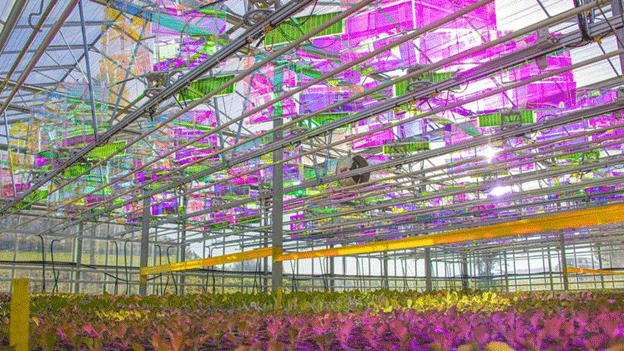Solar Energy Meets Agriculture
Harnessing renewable energy in greenhouses has traditionally posed challenges. Conventional photovoltaic systems block essential sunlight, hindering plant growth. However, Voltiris, a Swiss startup, has engineered a solution that integrates solar power production seamlessly into greenhouse operations.
Using an advanced spectral filtering technology, Voltiris PV panels selectively convert unused light wavelengths, such as UV, into electricity while allowing the critical light spectrum for photosynthesis to pass through. This ensures crops receive the sunlight they need while generating clean energy.
Pilot Implementation in Füllinsdorf
The Eschbach Gemüsebau farm, a leader in microgreen cultivation, partnered with Voltiris and EBL (Elektra Baselland) to test this cutting-edge technology. One-third of their greenhouse roof was fitted with Voltiris PV panels, producing over 50,000 kWh annually. By Spring 2025, the system will expand to cover the entire structure.
Farm owner Andreas Eschbach praised the system’s minimal disruption during installation and its compatibility with existing operations. Early observations suggest no adverse effects on plant growth, a crucial factor for light-sensitive crops like microgreens.
Energy Savings and Environmental Impact
Voltiris’s innovative PV panels address a significant challenge for greenhouse operators: reducing energy costs and carbon emissions without compromising production. By employing this technology, greenhouses can:
- Achieve self-sufficiency in energy production.
- Reduce reliance on external energy sources.
- Extend the usability of existing infrastructure without major modifications.
EBL’s contracting model makes the technology accessible. Farmers purchase electricity at a fixed rate without bearing the upfront costs of installation or maintenance, making it financially viable for small to medium enterprises.
Scaling the Solution
As global demand for renewable energy solutions rises, the Voltiris system offers a scalable model. The technology is especially promising for agricultural regions with high greenhouse activity but limited access to sustainable power sources.
EBL plans to roll out this solution across Switzerland, emphasizing local energy production and reducing dependency on fossil fuels.
The collaboration between Voltiris, EBL, and Eschbach Gemüsebau demonstrates that sustainable agriculture and renewable energy can go hand in hand. By addressing the dual challenges of energy efficiency and crop productivity, this next-generation solar technology has the potential to transform the agricultural industry, making it more resilient and environmentally friendly.












